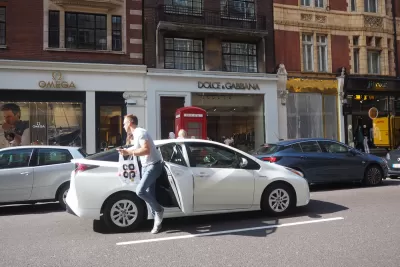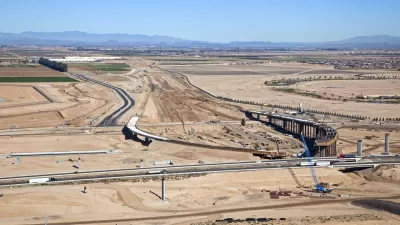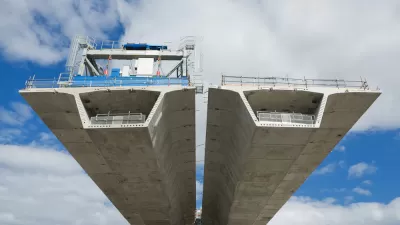The reality of ride hailing has fallen well short of the wishful thinking about reduced congestion and reduced pollution that defined the early days of Uber and Lyft.

"According to the Union of Concerned Scientists, ride-hailing trips today result in an estimated 69 percent more climate pollution on average than the trips they displace," reports Andrew J. Hawkins.
The Union of Concerned Scientists published a study on February 25 that included those findings.
At the heart of those findings is the fact that ride-hailing trips have been shown to displace trips from low-carbon modes, like public transit, biking, and walking. Hawkins says that reality also provides a path toward reduced emissions: "Uber and Lyft could reduce these emissions with a more concerted effort to electrify its fleet of vehicles or by incentivizing customers to take pooled rides, the group recommends."
As noted in the article, both Uber and Lyft have expressed a desire to limit emissions, but delivering on those expressed desires will be a tall order. Both companies have responded to the report, Uber promising to "continue to invest in products and advocate for policies that reduce car ownership, promote more pooled trips and support greater adoption of bikes, scooters, green vehicles and the use of public transit." Lyft called the study misleading.
FULL STORY: Uber and Lyft generate 70 percent more pollution than trips they displace: study

Study: Maui’s Plan to Convert Vacation Rentals to Long-Term Housing Could Cause Nearly $1 Billion Economic Loss
The plan would reduce visitor accommodation by 25,% resulting in 1,900 jobs lost.

North Texas Transit Leaders Tout Benefits of TOD for Growing Region
At a summit focused on transit-oriented development, policymakers discussed how North Texas’ expanded light rail system can serve as a tool for economic growth.

Using Old Oil and Gas Wells for Green Energy Storage
Penn State researchers have found that repurposing abandoned oil and gas wells for geothermal-assisted compressed-air energy storage can boost efficiency, reduce environmental risks, and support clean energy and job transitions.

Santa Barbara Could Build Housing on County Land
County supervisors moved forward a proposal to build workforce housing on two county-owned parcels.

San Mateo Formally Opposes Freeway Project
The city council will send a letter to Caltrans urging the agency to reconsider a plan to expand the 101 through the city of San Mateo.

A Bronx Community Fights to Have its Voice Heard
After organizing and giving input for decades, the community around the Kingsbridge Armory might actually see it redeveloped — and they want to continue to have a say in how it goes.
Urban Design for Planners 1: Software Tools
This six-course series explores essential urban design concepts using open source software and equips planners with the tools they need to participate fully in the urban design process.
Planning for Universal Design
Learn the tools for implementing Universal Design in planning regulations.
Ascent Environmental
Borough of Carlisle
Institute for Housing and Urban Development Studies (IHS)
City of Grandview
Harvard GSD Executive Education
Toledo-Lucas County Plan Commissions
Salt Lake City
NYU Wagner Graduate School of Public Service





























